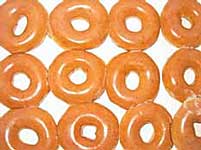Food Manufacturers Oppose Trans Fats Labels

PSA Rising, October 9, 2003. American food manufactuers are putting up a fight against labeling of trans fats in processed foods.
Trans fatty acids are present in many processed foods. People in the whole or "natural" foods movement chose years ago to avoid trans fatty acids, which is why they began to make and market "unhydrogenated" peanut butter, cold-pressed unhydrogenated oils, and such.
Now US food manufacturers have been ordered to get ready to label foods that contain trans fatty acids, so as to inform the consumer and allow choice.
Today, a spokeperson for National Food Processors Association (NFPA) opposed the creation of a nutrition label footnote on trans fat.
"NFPA does not believe that a trans fat footnote should be considered by FDA," said Dr. Rhona Applebaum, NFPA's Executive Vice President and Chief Science Officer. ÂIt appears FDA's assumption is that one of the primary purposes of a footnote is to educate consumers. We respectfully disagree with this premise. Consumers must be educated about the need to restrict their intake of trans fat using tools more effective than a label footnote.Â
ÂWhen developing messages focused on nutritional components such as trans fat, FDA must ensure that the message is clear and understandable for consumers, Dr. Applebaum stated. ÂInforming is not educating; we need to remember that. The food label is first and foremost an information tool. Educating consumers about nutrition requires other tools.Â
Dr. Applebaum noted ÂIn addition, why would one stop with only one message, focusing on trans fat? Is one such message too few? Are six too many? When and where would it stop?Â
What's the fuss? And will it make any difference to most people's daily intake considering that trans fats are all over the supermarket and in most coffee shop and restaurant foods (where in any case they will not be labeled).
Trans fats are present in most margarines (exceptions are explicitly sold as containing none), in hydrogenated peanut butters, in many candy bars and in most commercial baked goods such as muffins, cookies and cakes, pie crusts and donuts. Even "healthy" "low-fat" muffins, cereals and "power" energy candy bars typically contain reduced quantities of trans fats.
Also, trans fats may be found in baby formulas and in nutritional supplements designed for dieters and those marketed to the elderly and to cancer patients to help them maintain body weight. .
Trans fats are known to be bad for us even in tiny quantities. "The problem with trans fatty acids is that your body doesn't know what to do with them," said Brian Olshansky, M.D., University of Iowa Health Care professor of internal medicine. "Trans fatty acids may help preserve food so that it tastes good, but your body can't break them down and use them correctly," Olshansky said. "Normal fats are very supple and pliable, but the trans fatty acid is a stiff fat that can build up in the body and create havoc."
Before making any changes to your diet or health routine, it's always is best to consult with your physician or other health care professional.
![]()



